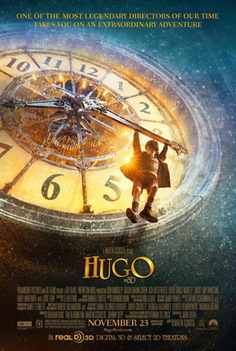Delightful. But don't close the tab yet. The film isn't excused from some things that should be discussed, so, on with the details and worthy points, 'ey? I'll start off by commenting on the premise and technical aspects, and I'll mark where I transition into the deeper elements of the screenplay (for those who care about such frivolities as "spoilers"). |
I can tell you without a shadow of a doubt thatHugo is the most gorgeous piece of motion picture color styling that I have ever seen. Nearly (I'm using "nearly" just to be safe) every frame is a work of saturation and gamma depth art that can be studied and learned from. The relatively small-scale, yet intricate sets are breathtaking. Ben Kingsley, whom some of you may remember fromSchindler's List and Moses, does not disappoint.
The film, in a nutshell, is about the re-discovery of imagination, especially imagination that may have been buried in hurt and loss over time. This journey, through which the protagonist discovers home and family, is told beautifully.
Now, on to the nitty-gritty. This is where the spoiler-concerned would probably want to stop reading.
Georges Méliès, the pioneer filmmaker whose works are featured in Hugo, and whose true story this film revolves around, was a man of creativity and imagination, to be sure, but the dark and twisted tones in a lot of his works bring up something I believe is key here. This was before the time of the Frankfurt School, before the great aesthetic agendas of our day. The men crafting these early films had no motivation besides their wildest dreams. What drove men like Méliès after that which would eventually become a dabbling in the first horror films?
The simple answer is that imagination comes from inspiration, and inspiration at it's heart is birthed from worldview. What inspired Georges? It's safe to say that his worldview was not one of created order and beauty.
You may be wondering how this is relevant to the Hugo viewing experience. Well, I'm happy to say that, in the interest of keeping the lighthearted spirit of imagination, all of Méliès' film excerpts that made it into Hugo are happily horror-free. I found most of it quite enjoyable, in fact. It was only on occasion that I was able to pick up on the more twisted side of Méliès' creativity.
The reason for this discussion is that, as discerning Christians, when we see a beautiful film about the wonders of imagination, we must ask ourselves if the film's concluding suggestion is honest and true. Is all imagination positive? Is it possible for the darkness of one's worldview to affect those who view one's creative works?
Lastly, does any of the above make Hugo a bad film? No, not at all. I reiterate that it is a delightful story and theme. These are simply things that must be considered with all discernment as it becomes increasingly vital that we test everything against our Biblical worldview. Remember, every film is a sermon; every frame is a message; every so-called "entertainment" experience, an opportunity to instill and teach so that our children will have the foundational worldview they need to face culture on their own.
The film, in a nutshell, is about the re-discovery of imagination, especially imagination that may have been buried in hurt and loss over time. This journey, through which the protagonist discovers home and family, is told beautifully.
Now, on to the nitty-gritty. This is where the spoiler-concerned would probably want to stop reading.
Georges Méliès, the pioneer filmmaker whose works are featured in Hugo, and whose true story this film revolves around, was a man of creativity and imagination, to be sure, but the dark and twisted tones in a lot of his works bring up something I believe is key here. This was before the time of the Frankfurt School, before the great aesthetic agendas of our day. The men crafting these early films had no motivation besides their wildest dreams. What drove men like Méliès after that which would eventually become a dabbling in the first horror films?
The simple answer is that imagination comes from inspiration, and inspiration at it's heart is birthed from worldview. What inspired Georges? It's safe to say that his worldview was not one of created order and beauty.
You may be wondering how this is relevant to the Hugo viewing experience. Well, I'm happy to say that, in the interest of keeping the lighthearted spirit of imagination, all of Méliès' film excerpts that made it into Hugo are happily horror-free. I found most of it quite enjoyable, in fact. It was only on occasion that I was able to pick up on the more twisted side of Méliès' creativity.
The reason for this discussion is that, as discerning Christians, when we see a beautiful film about the wonders of imagination, we must ask ourselves if the film's concluding suggestion is honest and true. Is all imagination positive? Is it possible for the darkness of one's worldview to affect those who view one's creative works?
Lastly, does any of the above make Hugo a bad film? No, not at all. I reiterate that it is a delightful story and theme. These are simply things that must be considered with all discernment as it becomes increasingly vital that we test everything against our Biblical worldview. Remember, every film is a sermon; every frame is a message; every so-called "entertainment" experience, an opportunity to instill and teach so that our children will have the foundational worldview they need to face culture on their own.

 RSS Feed
RSS Feed